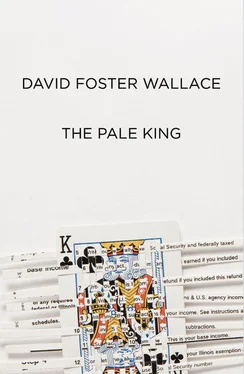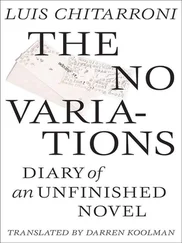David Wallace - The Pale King - An Unfinished Novel
Здесь есть возможность читать онлайн «David Wallace - The Pale King - An Unfinished Novel» весь текст электронной книги совершенно бесплатно (целиком полную версию без сокращений). В некоторых случаях можно слушать аудио, скачать через торрент в формате fb2 и присутствует краткое содержание. Год выпуска: 2011, Издательство: Little, Brown & Company, Жанр: Современная проза, на английском языке. Описание произведения, (предисловие) а так же отзывы посетителей доступны на портале библиотеки ЛибКат.
- Название:The Pale King: An Unfinished Novel
- Автор:
- Издательство:Little, Brown & Company
- Жанр:
- Год:2011
- ISBN:нет данных
- Рейтинг книги:3 / 5. Голосов: 1
-
Избранное:Добавить в избранное
- Отзывы:
-
Ваша оценка:
- 60
- 1
- 2
- 3
- 4
- 5
The Pale King: An Unfinished Novel: краткое содержание, описание и аннотация
Предлагаем к чтению аннотацию, описание, краткое содержание или предисловие (зависит от того, что написал сам автор книги «The Pale King: An Unfinished Novel»). Если вы не нашли необходимую информацию о книге — напишите в комментариях, мы постараемся отыскать её.
The Pale King
The Pale King: An Unfinished Novel — читать онлайн бесплатно полную книгу (весь текст) целиком
Ниже представлен текст книги, разбитый по страницам. Система сохранения места последней прочитанной страницы, позволяет с удобством читать онлайн бесплатно книгу «The Pale King: An Unfinished Novel», без необходимости каждый раз заново искать на чём Вы остановились. Поставьте закладку, и сможете в любой момент перейти на страницу, на которой закончили чтение.
Интервал:
Закладка:
The fact is that there are probably just certain kinds of people who are drawn to a career in the IRS. People who are, as the substitute father said that final day in Advanced Tax, ‘called to account.’ Meaning we are talking about almost a special kind of psychological type, probably. It’s not a very common type — perhaps one in 10,000—but the thing is that the sort of person of this type who decides that he wants to enter the Service really, really wants to, and becomes very determined, and will be hard to put off course once he’s focused in on his real vocation and begun to be actively drawn to it. And even one in 10,000, in a country as large as America, will add up to a fair number of people — roughly 20,000—for whom the IRS fulfills all the professional and psychological criteria for a real vocation. These twenty or so thousand comprise the Service’s core, or heart, and not all of them are high-ranked in the IRS administration, although some of them are. These are 20,000 out of the Service’s total of over 105,000 employees. And there are no doubt core characteristics that these people have in common, predictive factors which at some point or other kick in and cause a genuine calling to pursue tax accounting and systems administration and organizational behavior and to devote themselves to helping administer and enforce the tax laws of this country as spelled out in Title 26 of the Code of Federal Regulations and the Revised Internal Revenue Code of 1954, plus all the statutes and regulations entailed by the Tax Reform Act of 1969, the Tax Reform Act of 1976, the Revenue Act of 1978, and so on and so forth. What these reasons and factors are, and to what extent they coexist with the particular talents and dispositions the Service is in need of — these are interesting questions, which today’s IRS takes an active interest in understanding and quantifying. In terms of myself and how I got here, the important thing is that I discovered I had them — the factors and characteristics — and discovered this suddenly, by what seemed at the time like nothing more than a feckless mistake.
I’ve left out the matter of recreational drug abuse during this period, and the relation of certain drugs to how I got here, which in no way represents an endorsement of drug abuse but is just part of the story of the factors that eventually drew me to the Service. But it’s complicated, and somewhat indirect. It’s obvious that drugs were a big part of the whole scene in this era — this is well-known. I remember in the later seventies, the supposedly coolest recreational drug around Chicagoland college campuses was cocaine, and given how anxious I was at that time to conform, I’m sure I would have used more cocaine, or ‘coke,’ if I’d liked the effects. But I didn’t — like it, I mean. It didn’t cause euphoric excitement for me, it more just made me feel as though I’d had a dozen cups of coffee on an empty stomach. It was a terrible feeling, even though people around me like Steve Edwards talked about cocaine as if it was the greatest feeling of all time. I didn’t get it. I also didn’t like the way it made the people who had just done cocaine’s eyes bulge out and their lips move around on their face in strange, uncontrollable ways, and the way even shallow or obvious ideas suddenly seemed incredibly profound to them. My overall memory of this cocaine period was of being at some kind of party with someone on cocaine who kept talking to me in this very rapid, intense way, and of me trying to subtly back away, and of every time I take a step backwards they take a step forwards, and so on and so forth, until they’ve backed me against a wall of the party and my back is literally up against the wall and they’re talking very fast only inches from my face, which was something I didn’t like at all. This actually happened at parties during this period. I think I have some of my father’s inhibition. Close bodily proximity to someone who’s very excited or upset is something I’ve always had a difficult time with, which is one reason why the Audits Division was out of the question for me during the selection and posting phase at the TAC — which I should explain stands for ‘Training and Assessment Center,’ which roughly one quarter of today’s Service’s contract personnel above the grade of GS-9 have started out by attending, especially those who — like me — entered through a recruitment program. As of now, there are two such centers, one in Indianapolis and a slightly larger one in Columbus OH. Both TACs are divisions of what is commonly known as Treasury School, as the Service is technically a branch of the US Treasury Department. But Treasury also includes everything from the Bureau of Alcohol, Tobacco, and Firearms to the US Secret Service, so ‘Treasury School’ now stands for over a dozen different training programs and facilities, including the Federal Law Enforcement Academy in Athens GA, to which those posted to Criminal Investigations from the TAC are sent for specialized training which they share with ATF agents, the DEA, federal marshals, and so on and so forth.
Anyhow, downers like Seconal and Valium simply made me go to sleep and sleep through whatever noise, including alarm clocks, happened to occur for the next fourteen hours, so these were not high on my list of favorites, either. You have to understand that most of these drugs were both plentiful and easy to get during this period. This was especially true at UIC, where the roommate I watched the foot and hung out so frequently at the Hat with was something of a human vending machine of recreational drugs, having established connections with mid-level dealers in the western suburbs, whom he always got extremely paranoid and suspicious if you asked him anything about, as if these were mafiosi instead of usually just young couples in apartment complexes. I know one thing he liked about me, though, as a roommate, was that there were so many different types of drugs that I didn’t like or that didn’t agree with me that he didn’t have to be constantly worried about my discovering his stash — which he usually kept in two guitar cases in the back of his half of the closet, which any idiot could have figured out from his behavior with the closet or the number of cases he had back there versus the one guitar he actually brought out and played his two songs over and over with — or ripping him off. Like most student dealers, he did not deal cocaine, as there was too much money involved, not to mention coked-out people pounding on your door at 3:00 in the morning, so that cocaine was handled more by slightly older guys in leather hats and tiny little rat-like mustaches who operated out of bars like the Hat and King Philip’s, which was another fashionable pub of the period, near the Mercantile Exchange on Monroe, where they also serviced younger commodity traders.
The UIC roommate was usually generously stocked in psychedelics, which by that time had definitely passed into the mainstream, but personally psychedelics frightened me, mostly because of what I remembered happening to Art Linkletter’s daughter — my parents had been very into watching Art Linkletter in my childhood.
Like any normal college student, I liked alcohol, especially beer in bars, though I didn’t like drinking so much that I got sick — being nauseated is something I essentially can’t stand. I’d much rather be in pain than sick to my stomach. But I also, like almost everyone else who wasn’t an evangelical Christian or part of Campus Crusade, liked marijuana, which in the Chicagoland area during that period was called pot or ‘blow.’ (Cocaine was not called blow by anyone I ever knew, and only hippie posers ever called pot ‘grass,’ which had been the hip sixties term but was now out of fashion.) This pot usage had peaked during high school, but I still sometimes smoked pot in college, although I suspect this was largely a matter of just doing what everyone else did — at Lindenhurst, for instance, almost everyone smoked marijuana constantly, including openly on the south quad on Wednesdays, which everyone called ‘hash Wednesday.’ I should add that now that I am with the IRS, of course, my pot-smoking days are long behind me. For one thing, the Service is technically a law enforcement agency, and it would be hypocritical and wrong. Relatedly, the whole culture of the Examinations Division is inimical to smoking pot, as even rote exams requires a very sharp, organized, and methodical type of mental state, with the ability to concentrate for long periods of time, and, even more important, the ability to choose what one concentrates on versus ignoring, an ability which smoking marijuana would all but destroy.
Читать дальшеИнтервал:
Закладка:
Похожие книги на «The Pale King: An Unfinished Novel»
Представляем Вашему вниманию похожие книги на «The Pale King: An Unfinished Novel» списком для выбора. Мы отобрали схожую по названию и смыслу литературу в надежде предоставить читателям больше вариантов отыскать новые, интересные, ещё непрочитанные произведения.
Обсуждение, отзывы о книге «The Pale King: An Unfinished Novel» и просто собственные мнения читателей. Оставьте ваши комментарии, напишите, что Вы думаете о произведении, его смысле или главных героях. Укажите что конкретно понравилось, а что нет, и почему Вы так считаете.












